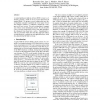624 search results - page 7 / 125 » Test set compaction algorithms for combinational circuits |
82
Voted
HASE
2008
IEEE
14 years 11 months ago
2008
IEEE
In this paper, we propose a randomization based technique to verify whether a manufactured chip conforms to its design or is infected by any trojan circuit. A trojan circuit can be...
ETS
2006
IEEE
15 years 5 months ago
2006
IEEE
A central problem in built-in self test (BIST) is how to efficiently generate a small set of test vectors that detect all targeted faults. We propose a novel solution that uses l...
88
Voted
DAC
2005
ACM
15 years 1 months ago
2005
ACM
This paper presents a new test response compaction technique with any number of unknown logic values (X’s) in the test response bits. The technique leverages an X-tolerant respo...
EAAI
2007
14 years 11 months ago
2007
This paper presents a swarm intelligence based approach to optimally partition combinational CMOS circuits for pseudoexhaustive testing. The partitioning algorithm ensures reducti...
89
Voted
VTS
2007
IEEE
15 years 5 months ago
2007
IEEE
In this paper, a novel test point insertion methodology is presented for RTL designs that aims to reduce the data volume of scan-based transition delay tests. Test points are iden...

